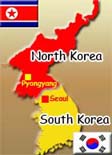Envoys discuss North Korea's nuclear programme
 Beijing - Envoys from South Korea and Japan discussed North Korea's nuclear weapons programme on Friday, amid uncertainty over whether Pyongyang is preparing to reassemble key facilities.
Beijing - Envoys from South Korea and Japan discussed North Korea's nuclear weapons programme on Friday, amid uncertainty over whether Pyongyang is preparing to reassemble key facilities.
Officials said US chief negotiator Christopher Hill would hold trilateral talks with the South Korean and Japanese envoys on the nuclear programme on Friday evening.
South Korea's Yonhap news agency said Hill's South Korean and Japanese counterparts, Kim Sook and Akitaka Saiki, respectively, held a bilateral meeting in Beijing earlier on Friday.
South Korea said it believed North Korea has started reassembly of its main Yonbgyon nuclear reactor, which was earlier being disabled and dismantled under a six-nation agreement for North Korea to end its nuclear weapons programme.
"Undesirable situations have continued recently," Yonhap quoted Kim as saying in Seoul earlier on Friday.
"We need to break the deadlock at an early date," he said.
"It is an important moment in which North Korea should resume the disablement measures and enter the six-way talks process," Kim was quoted as saying.
The United States on Thursday said it remained unclear about North Korea's intentions.
"We've seen no indications that they are in the process of rebuilding," State Department spokesman Robert Wood told reporters.
But Wood said North Korea's reported steps towards reversing the disablement of nuclear facilities were "obviously of a concern to us."
He said US officials were "working closely with the other allies in the six-party talks framework to try to see how we can go forward on this."
Wood said he was not aware of any plans for North Korean nuclear envoys to travel to Beijing this week.
He said Hill also planned to meet China's chief negotiator on North Korea, Wu Dawei, and was scheduled to leave Beijing on Sunday.
Yonhap on Thursday quoted South Korean officials as saying that North Korea had informed US nuclear inspectors of its decision to restart plutonium work.
The isolated communist nation announced August 14 that it had stopped disabling the nuclear plant where it produced weapons-grade plutonium, complaining about the US failure to remove it from a list of state sponsors of terrorism.
Last October, North Korea promised to disable its Yongbyon nuclear reactor in a six-party agreement with the United States, China, South Korea, Japan and Russia.
It blew up a cooling tower located next to the reactor in June, but has dragged its feet on agreeing to a verification regime for its nuclear disablement, a US precondition for scrapping sanctions. (dpa)